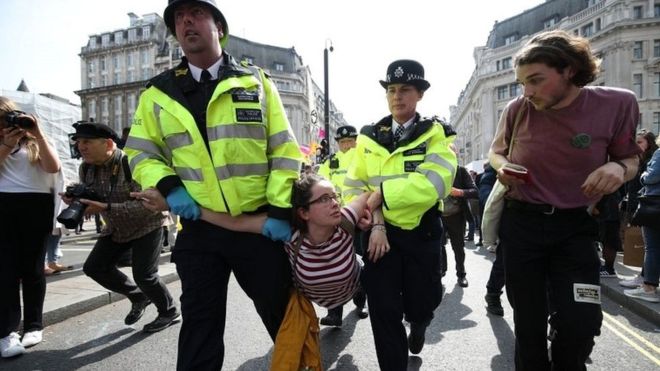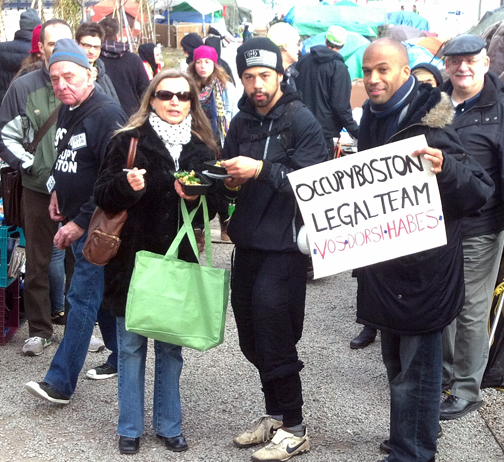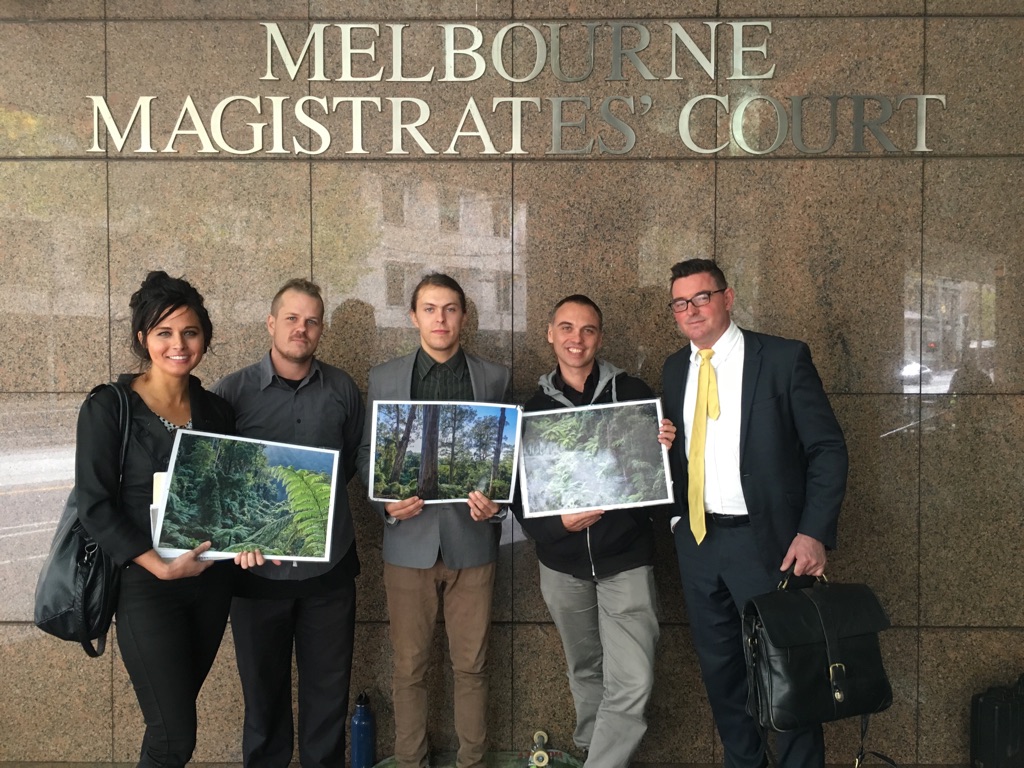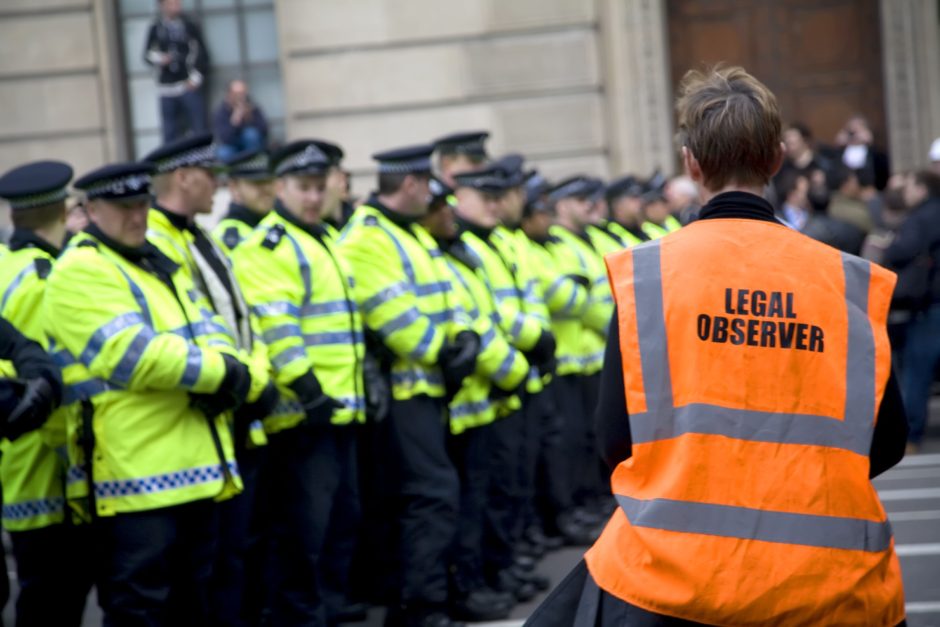What is this thing called Activist Legal Support?
Activist Legal Support is not just Legal Observing
Many people these days equate Legal Observing with “legal support” partly due to the relatively high visibility and profile of Legal Observing, particularly in Victoria – Legal Observers stand out whilst back-end legal support training / arrest support / court support is far less visible to anyone and therefore less understood.
In reality however- Legal Observing is one of the least important legal support roles in mass arrest scenarios – far less critical than arrest support roles, liaison with lawyers and the months of court support if and when people are charged.
In many ways activist groups, with limited resources, should focus on building their own dedicated legal teams, forming relationships with friendly lawyers, arranging legal briefings for activists and organising people to take on arrest support roles – long before they even think about organising their own Legal Observer Team.
So, what is Activist Legal Support?
A good legal support structure for groups engaging in protests that could be arrestable includes:
A Legal Support Team
A dedicated team within the activist group who plan, organise and coordinate legal support. This includes speaking with / advising and seeking regular confidential advice from lawyers about actions that are planned, what are the potential charges, whose jurisdiction a particular site is and what are the possible penalties. The team should be planning logistics, a network of lawyer contacts, organising police liaison, and coordinating a potentially large team of activists providing various legal support roles. In some mass civil disobedience actions, the legal support team has an office, its own roster, comms system and budget. Read about the S11 Legal Support Team here.
Legal Information
Arranging for clear, accurate, practical and realistic legal information to be provided to everyone who may be part of an action or campaign. Information should be drafted and verified by a solicitor, written in ‘plain’ language – (avoiding legal jargon) and always couched in terms of what is potential or possible. Police have discretion about when and what charges they lay, and courts have a lot of discretion in what penalties they provide so nothing is definite when providing activist legal information. The aim is to provide information so that people can make fully informed decisions about whether to place themselves in an potentially arrestable scenario but not to scare people from taking action.
This information can be provided in pamphlets, handbooks, blog posts or during activist trainings or in briefings before and during actions. Legal briefings can happen anywhere, anytime but they need to be planned as part of the action and people need to be prepped to provide them. They are best written or provided by lawyers or very well briefed para-legals.
Arrest Support
Arrest support roles are people who commit themselves to looking after the needs of people who are facing arrest or who get arrested at an action. They need to monitor who is arrested, find our where they might be taken, make sure personal belongings are safe, friends contacted and ensure that someone is there to collect them when they get out of police custody. Arrest support is a critical role. It might mean liaising assertively with police or watchhouse staff regarding the welfare of people inside, making sure people are not isolated or targeted, arranging lawyers, ensuring people in and have water and medical treatment – are safe and being treated properly. Arrest supporters can also observe, record and make note of police behavior and monitor arrests for later legal defense – particularly if there are no Legal Observers present. You dont have to have any legal training to do arrest support.

It is easy to loose track of arrestees at mass actions. Good arrest support can make the difference between someone having a traumatic experience and someone coming out of custody inspired to get to the next action.
Court Support
Court cases can go for many months, sometimes years. The activist campaigns should plan to support ALL those who face charges resulting for the action for the entirety of their court case. This means helping them find legal representation / plan a legal strategy, support them if they plead guilty or not-guilty, fund-raise for fines, organise for people to turn up at court appearances, assist with media throughout the case, be there for a victory celebration at the end, support the activists physically, emotionally, financially throughout. You don’t have to have any legal training to do court support.
Why is Legal Support Important?
We stress that a plan for on-going, hands-on legal support for protestors (such as during arrests and for court support) is essential, and is normally the most important aspect of legal support for activists. It is even more important as public order policing becomes increasingly paramilitary – by deploying violence and force against groups of unarmed people.
We strongly encourage activist groups to look into and organise these forms of ongoing legal support as a core part of your campaign planning.
The website activistrights.org.au has resources and downloadable PDF arrest support templates, which were originally designed for mass-arrest scenarios.
People in social movements are in it together, and we all have different roles to play. Facing the full might of the police and the criminal justice system is frightening but something people have done throughout history. Planning good activist legal support builds movement resilience and make it more likely we will come out of it stronger.
Our rights are routinely violated but movements are made stronger when people know their rights, vocalise them, and we respond collectively and assertively when they are. Solidarity, in the streets, in police custody and in the courts is our most powerful tool.
There are three core aspects of Activist Legal Support: information, support and solidarity.
Legal information is best provided by lawyers or legal practitioners. Support is best provided by a well-organised legal support team. Other activists can only really provide solidarity. All three of these are crucial in good activist legal support.
What is the difference between Legal Observing and other forms of legal support?
Legal Observing is most effectively done by external/independent groups who can focus on civil and political rights rather than on the action itself.
Legal Observers (LOs) act as an independent, third party who monitoring police behaviour at protests and actions. This is known as ‘legal observing’.
Legal Observing takes activists away from these other arrest support roles so it is always wise to ask another group or organisation to take on that role. MALS is one of the only legal support groups in Australia who regularly trains and fields Legal Observer Teams but community legal centres, church groups, human rights organisations such as Amnesty International have all organised Legal or Human Rights Observer teams in different states in the past.
For big civil disobedience events it might be wise to approach one of these larger independent groups, with plenty of notice, to provide a team of volunteer observers if they can–and allow your activists to focus on the actual action.
In monitoring the police, Legal Observers compile evidence which can later be used in court if protesters are wrongly prosecuted, or wish to bring actions against the police.
Legal Observer teams aim to widen the political space to take protest action. Their presence can also provide both a feeling of safety and a deterrent effect on police.
As observers, Legal Observers are removed from the protest itself, which allows them to objectively and independently describe events. It is in this form that Legal Observers are most effective in monitoring police behaviour.
You can think of Legal Observing as just one of the many parts that provide shared social movement infrastructure, along with medical support (street medics) and groups that are dedicated to providing food to protesters (for example, Food Not Bombs).
We may be able to help but we cant do everything: you can get in contact with MALS if you would like to request that MALS provide a Legal Observer Team at actions or demonstrations, or come along to one of our training events.
But we are a small, all volunteer and entirely unfunded group. There is simply no way we could organise legal support for every activist group, action or campaign in Melbourne. YOU need to do that! We can support, advise and provide resources where we can…
You can always contact us.


